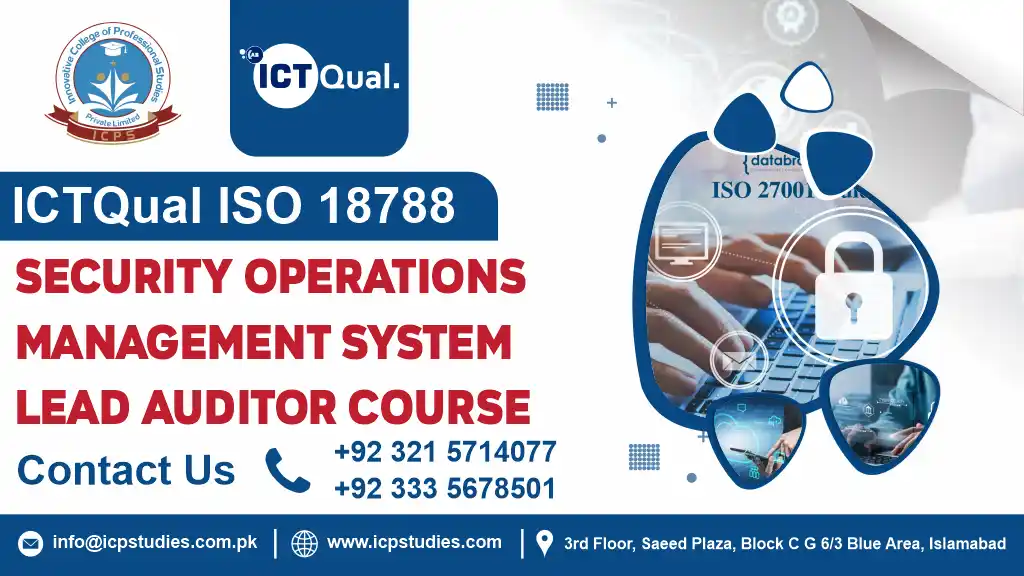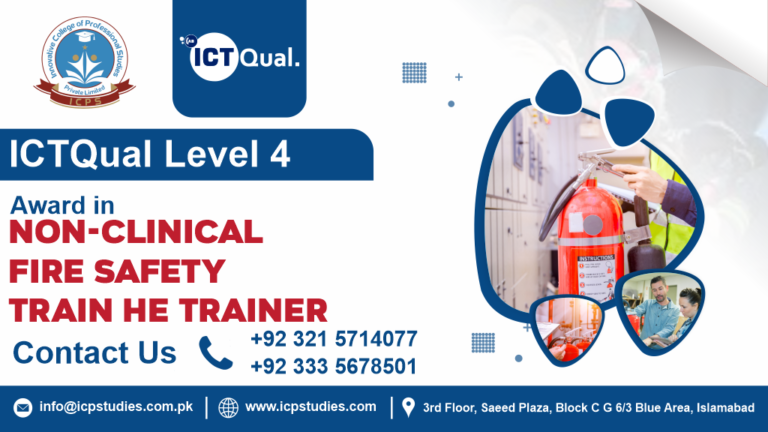In an increasingly complex world, the management of security operations is crucial for organizations to protect their assets, personnel, and reputation. The ICTQual ISO 18788 Security Operations Management System Lead Auditor Course offers a comprehensive approach to mastering the auditing and management of security operations systems in line with international standards. If you’re looking to enhance your skills in security management and auditing, this course is an invaluable opportunity.
The ICTQual ISO 18788 Lead Auditor Course is a specialized training program designed to equip professionals with the skills and knowledge necessary to audit and manage security operations in accordance with the ISO 18788 standard. ISO 18788 provides a framework for establishing, implementing, operating, monitoring, reviewing, maintaining, and improving security operations management systems.
The ICTQual ISO 18788 Security Operations Management System Lead Auditor Course is an essential program for professionals aiming to excel in the field of security management and auditing. By providing specialized training on ISO 18788 standards and auditing techniques, this course equips you with the expertise needed to lead effective audits and enhance security operations within organizations. Whether you’re seeking career advancement or aiming to improve your organization’s security practices, this course offers valuable insights and skills that can make a significant impact.
All About ICTQual ISO 18788 Security Operations Management System Lead Auditor Course
Course Overview
The ICTQual ISO 18788 Security Operations Management System Lead Auditor Course is an advanced training program designed for professionals involved in security management and auditing. This course provides comprehensive instruction on how to effectively audit and lead the implementation of security operations management systems in compliance with the ISO 18788 standard.
The ICTQual ISO 18788 Security Operations Management System Lead Auditor Course is an essential program for those seeking to excel in security management and auditing. By offering specialized training on ISO 18788 standards and auditing practices, the course prepares professionals to lead effective audits and enhance security operations within organizations. Whether aiming for career growth or improving organizational security, this course provides the expertise needed to make a significant impact.
Study Units
- Introduction to Security Operations Management Systems
- Core Elements of Security Operations Management
- Principles of Auditing Security Operations Management Systems
- Planning and Preparation for Security Operations Audits
- Conducting Security Operations Audits
- Reporting and Documentation of Audit Findings
- Corrective Action and Follow-Up
- Continuous Improvement and Professional Development
The entry requirements for the ICTQual ISO 18788 Security Operations Management System Lead Auditor course typically include:
- Educational Background: A degree in security management, business administration, risk management, or a related field is preferred.
- Work Experience: Relevant experience in security operations, risk management, or quality assurance, usually 3-5 years.
- Familiarity with ISO Standards: Basic knowledge of ISO 18788 and related security management standards is beneficial.
- Understanding of Security Operations: Awareness of security management principles, best practices, and relevant regulatory requirements.
- Audit Experience: Prior experience in conducting audits or assessments, particularly in security or operational contexts, is often required.
- Analytical Skills: Ability to analyze security operations and evaluate compliance with standards.
- Communication Skills: Strong verbal and written communication abilities to effectively engage with stakeholders during audits.
- Security Managers: Professionals responsible for overseeing security operations within organizations.
- Risk Management Professionals: Individuals focused on assessing and mitigating security risks in various environments.
- Quality Assurance Auditors: Those assessing compliance with security management standards and practices.
- Operations Managers: Professionals involved in managing operational processes that require a strong security component.
- Security Consultants: Experts advising organizations on best practices in security operations and ISO 18788 implementation.
- Internal Auditors: Individuals conducting internal audits of security operations to ensure compliance and improve practices.
- Compliance Officers: Those ensuring adherence to security regulations and standards within an organization.
This course equips participants with the skills and knowledge necessary to effectively audit and assess security operations management systems according to ISO 18788 standards.
Learning Outcome
Introduction to Security Operations Management Systems
Learning Outcomes:
- Define SOMS: Explain the concept and purpose of Security Operations Management Systems (SOMS) as outlined in the ISO 18788 standard.
- Understand the Framework: Describe the framework and scope of ISO 18788, including its importance for managing security operations.
- Identify Key Components: Recognize the core components of SOMS and their roles in ensuring effective security management.
2. Core Elements of Security Operations Management
Learning Outcomes:
- Understand Core Elements: Identify and describe the core elements required for an effective Security Operations Management System, including policies, procedures, and controls.
- Implement Policies: Demonstrate how to implement and manage these core elements within an organization to ensure robust security operations.
- Evaluate Effectiveness: Assess the effectiveness of these elements in meeting security objectives and compliance requirements.
3. Principles of Auditing Security Operations Management Systems
Learning Outcomes:
- Audit Principles: Explain the fundamental principles and ethics of auditing, specifically as they relate to security operations management.
- Understand Audit Standards: Describe the standards and methodologies used in auditing SOMS, including the ISO 18788 requirements.
- Develop Auditor Skills: Develop key skills necessary for conducting audits, such as objectivity, independence, and thoroughness.
4. Planning and Preparation for Security Operations Audits
Learning Outcomes:
- Audit Planning: Outline the steps required to plan an effective audit of a Security Operations Management System, including defining audit scope and objectives.
- Preparation Techniques: Demonstrate techniques for preparing audit materials, such as audit plans, checklists, and schedules.
- Risk Assessment: Conduct a preliminary risk assessment to identify potential issues and areas of focus for the audit.
5. Conducting Security Operations Audits
Learning Outcomes:
- Audit Execution: Describe and demonstrate the procedures for conducting a security operations audit, including data collection, interviews, and observation.
- Engage with Stakeholders: Effectively engage with stakeholders during the audit process to gather relevant information and insights.
- Evaluate Compliance: Assess compliance with ISO 18788 standards and other relevant security requirements during the audit.
6. Reporting and Documentation of Audit Findings
Learning Outcomes:
- Prepare Reports: Learn how to prepare comprehensive and clear audit reports that document findings, conclusions, and recommendations.
- Effective Documentation: Demonstrate effective documentation practices, including recording evidence, observations, and audit results.
- Communicate Findings: Communicate audit findings to relevant stakeholders in a way that is clear, actionable, and facilitates decision-making.
7. Corrective Action and Follow-Up
Learning Outcomes:
- Develop Action Plans: Explain how to develop and implement corrective action plans to address audit findings and non-conformities.
- Monitor Implementation: Demonstrate how to monitor the implementation of corrective actions and verify their effectiveness.
- Follow-Up Procedures: Understand and apply procedures for follow-up audits and reviews to ensure sustained compliance and improvement.
8. Continuous Improvement and Professional Development
Learning Outcomes:
- Promote Improvement: Identify methods for fostering continuous improvement in Security Operations Management Systems based on audit results and feedback.
- Professional Growth: Develop a plan for ongoing professional development and staying current with updates to ISO standards and auditing practices.
- Enhance Skills: Engage in activities and training that enhance auditing skills and knowledge in security operations management.
These learning outcomes ensure that participants of the ICTQual ISO 18788 Security Operations Management System Lead Auditor Course acquire a thorough understanding of both the theoretical and practical aspects of auditing security operations. The course is designed to prepare individuals to effectively lead audits, improve security operations, and contribute to the ongoing development of their organizations’ security management practices.
FAQs about ICTQual ISO 18788 Security Operations Management System Lead Auditor Course







